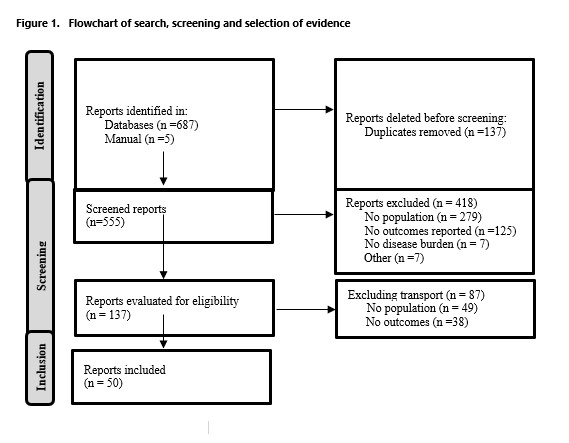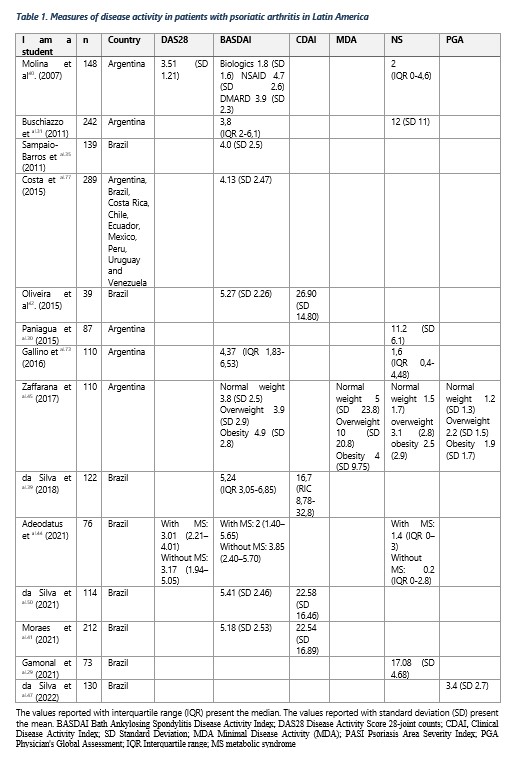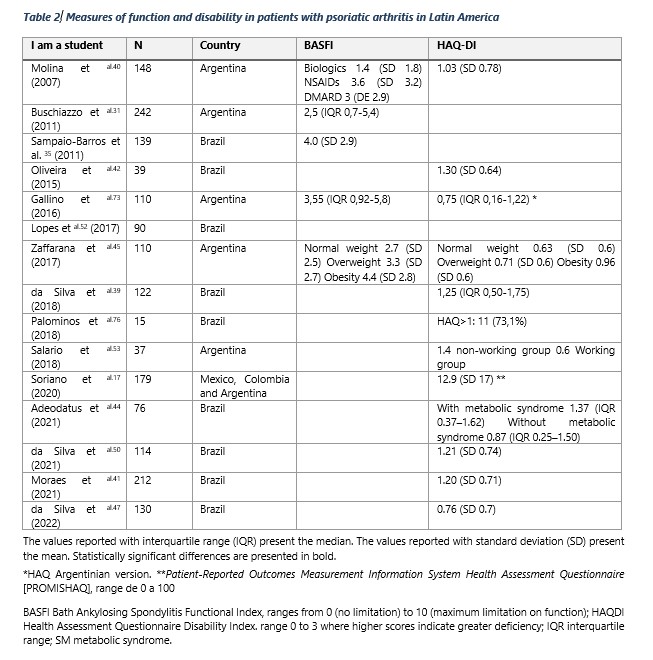Session Information
Session Type: Poster Session A
Session Time: 9:00AM-11:00AM
Background/Purpose: Psoriatic arthritis (PsA) is a chronic inflammatory pathology that generates a substantial and progressive deterioration of functionality and quality of life. It is associated with comorbidities such as cardiovascular disease, metabolic diseases and a significant compromise of mental health. In Latin America, information regarding the disease is limited. This study reviews the burden of disease (disease activity, function, clinical manifestations, comorbidities, patient-reported outcomes, quality of life, and use of health resources) in adults diagnosed with PsA in Latin America.
Methods: A SLR of the literature was carried out to determine the burden of PA in Latin America, under a qualitative and quantitative approach, following the PRISMA report. Publications in PUBMED, EMBASE, Cochrane Database of Systematic Reviews – CDSR, LILACS, Scielo, Redalyc, conference abstracts and grey literature, were reviewed. The full texts of potentially eligible studies were assessed independently, extracting in each the data requested by a pre-specified data collection instrument. Quality was assessed according to the type of study. Risk of bias assessment was performed with the instrument validated for cross-sectional studies, for cohort studies the instrument validated (CLARITY tool) was used. The Joanna Briggs quality tool was used for economic evaluations. To reduce publication bias, we searched grey literature.
Results: We identified 692 references, selecting 50 studies: 41 cross-sectional, 4 economic studies, 4 cohort studies and 1 systematic review. The information comes mainly from Brazil, Argentina and Mexico. The estimated disease prevalence for Latin America ranges from 0.004% to 0.08% (95% CI 0.02–0.20). The disease duration was reported with a mean of 7.2 years (95% CI 6.94-7.52). DAS28 scored between mild to moderate disease activity (mean 3.01–3.51). Lower activity was reported in patients with normal body weight versus those who were overweight or obese. Disability assessed using the HAQ-DI reports data of 1.1 ±0.7. Patients treated with biologics had fewer impairments in function than those treated with NSAIDs, without treatment or with DMARD. The SF-12 health survey, report averages of 43 (physical component) and 42-45 (mental component). In a registry, 39.6% of these were employed. The greater the severity of the disease, the lower the employment rate (mild:50%, moderate:38.7%, severe:38.5%). Twelve studies reported frequency of medication use, 30.3% (6.2%-42.5%) receiving corticosteroids, 47.8% (38.5%-82.4%) methotrexate, 38.3% (9.2%-40.6%) leflunomide and 23.5% (8%-56.2%) biologics.
Conclusion: This study reports a considerable burden of disease in patients with PsA in Latin America, with involvement of quality of life associated with disability in relation to disease activity and its various manifestations. Measurements with validated instruments suggest suboptimal assessment of disease domains, significant functional compromise, loss of productivity, and high frequency of comorbidities, including mental health.
To cite this abstract in AMA style:
Bautista-Molano W, Ibata L, Martinez S, Chacon A. Burden of Disease of Psoriatic Arthritis in Latin America: A Systemic Review of Literature [abstract]. Arthritis Rheumatol. 2023; 75 (suppl 9). https://acrabstracts.org/abstract/burden-of-disease-of-psoriatic-arthritis-in-latin-america-a-systemic-review-of-literature/. Accessed .« Back to ACR Convergence 2023
ACR Meeting Abstracts - https://acrabstracts.org/abstract/burden-of-disease-of-psoriatic-arthritis-in-latin-america-a-systemic-review-of-literature/



